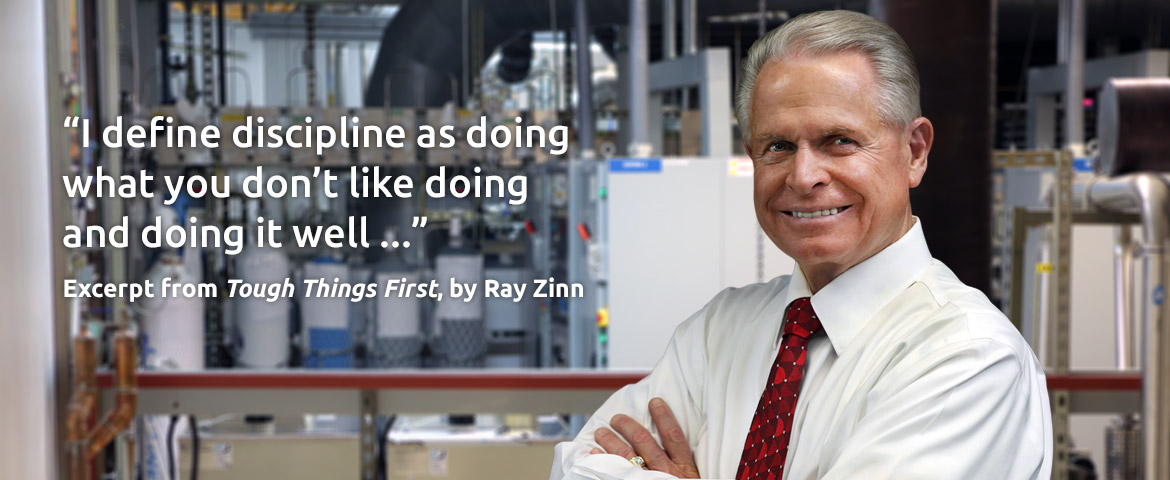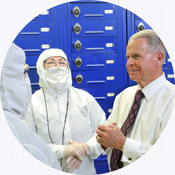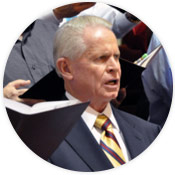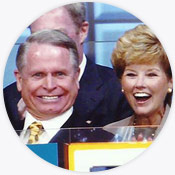
You and Tough Things First

Ray Zinn developed his sense of managerial discipline early, becoming a track and gymnastics star.
Good leaders have discipline. Great leaders give it to their teams.
Tough Things First is about more than just discipline, but you won’t go far in life or business without it. Tough Things First is a guide for people starting companies, leading enterprises, or even marshaling volunteers for community service. Tough Things First is the book you need in order to understand your entrepreneurial spirit, harness the creative power of your employees, and achieve your visions.
“That is the essence of discipline: doing the tough things first. When I wanted to run the high hurdles, I did the hard and unpleasant work of physically training my body to succeed at the sport. To get a college degree, I did the hard and occasionally unpleasant work of studying, researching and test-taking.
Any underachiever can blunder through a task with lackluster results. I define discipline as doing what you don’t like doing and doing it well — having the determination, no matter how difficult a task, to do it correctly. To do everything superbly is the end result of discipline, on a personal level or for an enterprise. The task could be as complex as designing a critical microchip component for a manned spacecraft, or as simple as cutting the grass.”

Ray Zinn’s leadership philosophy goes into every corner of an enterprise, improving the lives and happiness of each employee.
Leading people comes from serving them and assuring they see value in all that they do.
MBA degrees are important, but too often incomplete. Mastering the minutia of financial planning is essential, but effectively guiding the efforts of a large group of people requires leadership, a skill not taught well enough in business schools. To lead requires knowing people, serving them instead of mastering over them, and communicating things that cannot be seen, touched or experienced.
“An entrepreneurial CEO who works directly with all of his employees, and who uses servant leadership remains humble. By focusing on his people to accomplish the corporate mission, and by making himself their tools for completing their work, he avoids the tar pit of egotism. If your ego grows large, it interferes with every relationship including those with your employees.
Servant leadership is a very powerful means for developing entrepreneurial discipline, as well as humility. To lead requires knowing why people follow, and you can never learn that without first following yourself. By being a servant to your employees — doing menial tasks from helping with funding a project to picking up a piece of scrap paper off the floor — you learn the art of following the needs of the organization and the people within, while simultaneously demonstrating thorough commitment to doing what has to be done for the company.
A soldier disdains the general who stays back at the pentagon, but General George Patton’s troops followed him willingly into battle because he was with them in the trenches. But you don’t have to duck flying bullets to gain the respect and enthusiastic participation of your employees — you merely have to be involved as an equal and willing to serve them. By following, we lead and learn to lead. By serving we learn to ask for service in the right ways.”
Surrounding yourself with bright people is wise, but can lead to analysis paralysis or worse yet, conventional thinking.
Excerpt from Tough Things First, by Ray Zinn


Ray Zinn’s management philosophy involves entrepreneurs in every detail of orchestrating their company.
To lead is to prepare to manage. Management is the implementation of leadership.
Leadership and management are intertwined. No good executive or entrepreneur lasts long unless they manage the process while leading their people. Tough Things First shows how to manage growing or mature organizations using well-honed principles of both.
“The walking-around principle — a management invention credited to Hewlett Packard’s founders — is one tool CEOs have for getting necessary bodily feedback to detect organizational health problems or confirmation about good corporate fitness. Every CEO should routinely get out of his office and visit each department and working group so that he understands the problems that they face. He should meet with them as groups, engage employees one-on-one, and drop in on birthday celebrations. The details lie outside of the CEO’s office, and the devil sleeps in the details. The CEO must keep the devil awake and moving along.
If a CEO relied on only filtered input, he might slough off bad information as an obese man might ignore that first tightness in his chest. A CEO who walks about might recognize instead the first sign of a corporate heart attack. But the inverse applies — being exposed to the subtle shifts and day-to-day vagaries of each business component allows a CEO to understand that the chest tightness might simply be corporate indigestion and worth waiting out until the next monthly financial reports.
Some entrepreneurs believe that the right way to manage their organization is to surround themselves with bright people and let them handle the details. This is like a man with five brains. He may have a healthy and vigorous body, but the five brains either try forcing the body to run in many different directions at once, or he argues with himself and runs nowhere. The latter condition is far too common and completely antithetical to entrepreneurial endeavors.
Surrounding yourself with bright people is wise, but can lead to analysis paralysis or worse yet, conventional thinking.”

According to Ray Zinn, leading employees is centered on fulfilling the basic human need of happiness, which is based on believing every person is valuable.
Great employees can be created, if you know what motivates nearly all humans.
Micrel had an astonishingly low employee turnover rate, mainly because Ray Zinn taps this essential element of human nature, nurtures it throughout the company and between working groups therein.
“Paying attention to the things that are the basis of human happiness is why Micrel has a low turn-over rate and many boomerang employees — ones who leave us, then come back after tasting the culture in other companies. Our boomerang employees often say things like “Wow, that was too big of a sticker shock,” after seeing how other companies valued and devalued their employees. Some, mainly those who come to us straight out of college, did not think they liked it here at Micrel and took jobs elsewhere. About half of them come back because they discovered that what they first thought of as restrictive was actually liberating, and that much of Silicon Valley works only on a financial basis, not a human one. Other employers took care of their wallets, but Micrel also took care of their hearts. Happiness comes from within, and no boss or corporate culture can make somebody happy. Yet a boss and his company can facilitate happiness, nurture innovation, thereby allowing employees to be part of something that feeds their innate human needs.
Truly happy people have found value in their existence. Something — be it love, community, achievement, involvement — has made their time on earth important and thus they are important themselves. Most people discover their hearts are at great peace when they are in service to others, be it their children, their aging parents, or even strangers at the local homeless shelter. Employees who dutifully come to the office, work their exact eight hours, mindlessly follow detailed procedures and try only hard enough to meet their MBO scores do not perceive they are valuable. Employees who happily rush to the office where they have the permission to innovate, feel connected to others in the organization, and exceed any MBO expectations. They know they have value.”

Ray and DeLona Zinn ringing the bell at NASDAQ.
Every company must deal with adversity. How you deal with it defines success.
Ray Zinn founded and ran Micrel for nearly forty years. His semiconductor industry experiences wild swings in demand, technology and fortune. Yet Micrel was profitable from day one, with the exception of a single year during the dot-com implosion. This track record speaks to how a great leader manages corporate adversity. Ray’s personal story shows this as well.
“Of all bodily senses, eyesight is the most essential. I lost mine shortly before Micrel issued its initial public offering.
I was in London on a leg of our IPO roadshow, where Micrel senior management was engaging investors in the last months before we went public.
But none of this slowed down the Micrel IPO.
Impaired eyesight does not impair entrepreneurial vision. The entrepreneur cannot see everything all at once, but develops the discipline to see what needs to be seen in the context that keeps the brain fully informed at all times. This requires acquiring the discipline to focus intently, filter the unnecessary and maintain the correct perspective.
My blindness occurred in November of 1994. Two decades later, my eyesight remains limited, but my vision has improved.”

